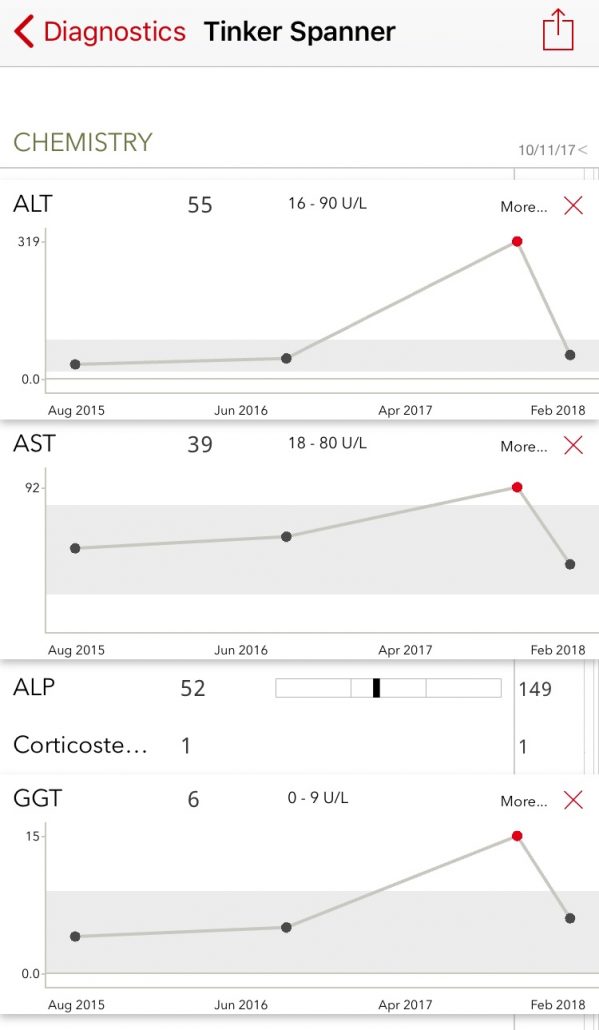There isn’t just one sort of liver problem. Read the warning signs and how vets diagnose and treat liver diseases in dogs and cats.
What Is Liver Failure?
The liver does three main things:
- Convert food-based nutrients into useful products
- Detoxify and eliminate other chemicals
- Manufacture vital substances
Liver failure is when one or all of these are disrupted. Therefore we can see a failure of absorption of nutrients, a buildup of toxins or a lack of essential items like blood clotting factors.
Symptoms Of Liver Failure
The liver is vital to the normal function of the body. Therefore, signs of early failure can be any reduction in health, such as:
- Dull coat
- Weight loss
- Vomiting or diarrhoea
- Lethargy
- Poor appetite
- Increased thirst
Signs of more advanced liver disease can be:
- Enlarged abdomen
- Yellow tinge to eyes and gums
- Behaviour change, collapse or seizure
Most of the time, we diagnose liver disease much earlier thanks to elevations in liver enzymes on routine blood testing. You can read about our vet’s dog here.
Effects on the brain, called hepatic encephalopathy, are caused by toxins (often from food) bypassing the liver and entering the general circulation. Most of the time this is due to a failing liver being unable to cope, but occasionally we see a congenital form in puppies (see later).
You can read about the successful treatment of a dog with hepatic encephalopathy here.
What Liver Enzyme Elevations Mean
This page explains all the features of a routine wellness blood test. Within the long list are several that tell us about liver health. These are:
- ALP is an enzyme mainly of the biliary system and bone
- ALT is an enzyme found mostly in liver cells
- AST and GGT are both enzymes found in liver and elsewhere
- Bilirubin is the yellow pigment that is normally removed via the biliary system into the faeces
- Urea, glucose and albumin are manufactured in the liver
When enzymes are elevated it can indicate damage to the cells that contain them. The pattern of elevations can tell us a lot but it’s important to remember that no enzyme is 100% specific to the liver. For example, all young animals have an elevated ALP due to bone production.
Elevations in bilirubin can mean either a failure of removal by the liver or an increase in production, such as in certain anaemias. Low albumin can mean liver failure, but also the excessive loss from the kidneys or gut.
Causes Of Liver Failure
No diagnosis and therefore no certain treatment can be made just by looking at the routine lab results. All these do is tell us that something is wrong. In order to get a definitive answer, we need further tests. These may include:
- Cushings disease tests
- Pancreatitis testing
- Tests for thyroid disease (cats only)
- Abdominal ultrasound
- Postprandial bile acids
- Blood clotting tests
- Liver biopsy
Once the correct testing is done, the common causes of elevated liver enzymes include:
- Cushings Syndrome (dogs)
- Liver tumour (read about Trixie’s liver tumour)
- Cholangiohepatitis (inflammation or infection of the biliary system in cats)
- Chronic active hepatitis (dogs)
- Heart failure, pancreatitis, diabetes and thyroid disease also cause changes in liver enzymes that respond to treating the underlying problem
Other rarer diseases we have seen include:
- Breed-associated storage diseases
- Toxic liver damage (especially mouldy food, toadstools & drugs)
- Portosystemic shunt (a fault in puppies where blood from the gut bypasses the liver via an abnormal blood vessel)
Sometimes a liver biopsy will show us that enzyme elevations (especially ALP) are not associated with liver failure at all. Vaccination against canine viral hepatitis has made it so rare that we have never seen a case in Adelaide.
Treatment of Liver Failure
By now you can see there is not one treatment based only on elevated enzymes. Each disease has a specific treatment that I won’t cover here. Many of these can even be cured and lead to a complete recovery.
If the liver function cannot be restored to normal, or disease is ongoing, we may recommend some of the following treatments. However, please talk to your vet about how useful these will be for your pet’s specific problem.
Liver Diets
Liver diets can have a huge effect on a dog’s quality of life. They work by reducing the work the liver has to do. Therefore toxin levels go down and appetite usually goes up. Read about a successful diet for hepatic encephalopathy here.
You can make a liver diet yourself but we get excellent results with the off-the-shelf products made by Hills and Royal Canin.
Liver Medicines
Supplements for liver disease are commonly available. We often use S-adenosylmethionine and ursodeoxycholic acid. Occasionally milk thistle extract, or silymarin, can also be useful, plus Vitamins E and K.
In cases of high blood toxin levels, antacids to reduce stomach acidity and lactulose to help remove toxins are also added.


